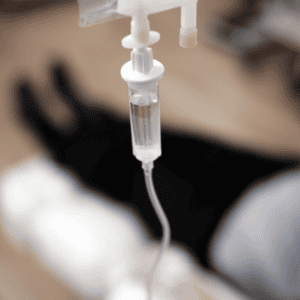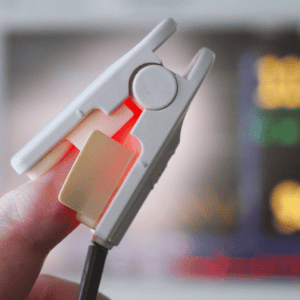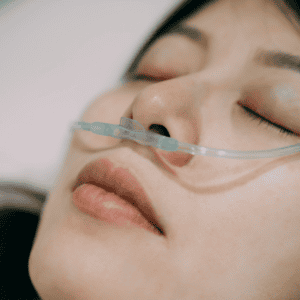Dental anxiety is a common challenge for many of our patients, often leading to delays in seeking necessary treatment. Fortunately, advancements in sedation dentistry, particularly intravenous (IV) sedation, have made it easier for patients to undergo dental procedures comfortably and with minimal stress. We are very excited to be bringing IV sedation to our Brisbane CBD dental practice in early 2025. In a previous blog, we talked about the different kinds of dental sedation available for dental anxiety. In this blog, we’ll take a deep dive into what IV sedation is, how it works, its benefits, and what to expect during your visit.

What is IV Sedation?
IV dental sedation is a conscious sedation technique used to help patients relax during dental procedures. It’s great for those with dental anxiety. You might have heard of it being called ‘twilight sedation’ or ‘sleep dentistry’. Unlike oral sedation, which involves taking a pill beforehand, or inhalation sedation where you breathe in a gas (happy gas), IV dental sedation allows the sedative to be administered directly into the bloodstream.
The benefits of this method is that it offers a more precise control over the level of sedation. We are able to titrate the sedative medication. All of us are different and we all respond differently to medications. By being able to titrate the medication, we can have control over your depth of sedation. This means that you will be more sedated than if you had taken an oral sedative or if you were using nitrous oxide (happy gas). This makes IV sedation an ideal choice for more extensive dental work or for patients with more dental anxiety.

How Does IV Sedation Work?
During an IV sedation procedure, our qualified dental sedationist will place a small IV line into your arm or hand. Through this line, sedative medication is delivered, allowing the sedationist to adjust the level of sedation based on your needs.
Patients typically experience a state of deep relaxation, often feeling drowsy but still able to respond to verbal cues. The sedatives used can vary, but include medications which provide anxiolysis (anxiety relief) and amnesia for the procedure (so you don’t remember what has happened). It’s due to this amnesic effect that many patients think they have slept through the procedure. Patients generally feel their dental anxiety diminish with the sedative medication. Being conscious and able to respond makes the procedure safe, and you are able to communicate with your caring dental team throughout.
You are also attached to monitoring equipment which will measure things like your breathing and heart-rate. This allows us to keep a close eye on you throughout the dental sedation procedure, keeping you safe and comfortable.

Benefits of IV Sedation
Rapid Onset: Sedation takes effect quickly, often within minutes, allowing for a more efficient dental visit.
Deep Relaxation: Patients often feel calm and relaxed, making it easier for them to undergo lengthy or complex procedures. Not only for those with dental anxiety, but also for those undergoing more complex treatment who don’t want to be aware.
Amnesia Effect: Many patients do not remember the procedure afterward, reducing the likelihood of dental anxiety related to future visits.
Customised Levels of Sedation: Dentists can easily adjust the dosage during the procedure, ensuring patients remain comfortable throughout.
Suitable for Various Procedures: IV dental sedation can be used for a range of dental treatments, from routine cleanings to more invasive surgeries.
Who would benefit from IV Sedation
Those who benefit from dental IV sedation are:
- those with dental anxiety and phobias (but not very severe phobias)
- those with bad gag reflexes (sedation diminishes the gag reflex)
- those who need a complex or invasive procedure and don’t want to remember it. You may not be generally anxious of the dentist, but the thought of having dental implant surgery is just too much!
However, as with any medical or dental procedure, there are always risks. In order to keep our patients safe, we do a thorough consultation and our dental sedationist has a strict criteria for who is a good candidate for sedation at our Brisbane practice. Some people are not suitable due to certain medical conditions, and may better be treated in a hospital with a general anaesthetic.
We also have to consider the procedure being carried out – very lengthy and complex procedures may be better performed under general anaesthesia, or we may have to split your treatment up into multiple appointments.
We must also consider your anxiety levels – those with severe dental phobias that want to be fully asleep will require general anaestheisa.

What to Expect During Your Appointment
Pre-Procedure Consultation: Before your appointment, you’ll have a consultation to discuss your medical history, medications, and any concerns you may have. This is crucial for ensuring that IV sedation is safe for you. You will also be given all the instructions to follow the day before and on the day of sedation.
Arrival at our Brisbane City Dental Practice: On the day of your procedure, arrive a little early. Your treating team will want to check if there have been any changes to your health, and to ensure that you have followed all the instructions. You also have a chance to ask any last minute questions.
IV Placement: The dental sedationist will place the IV line. If you are anxious about having the IV line placed, we can offer inhalation sedation to help you relax before we place the IV line. Once the line is in and the sedative medications are administered, you’ll start to feel much more relaxed
The Procedure: During the dental work, you may be in a twilight state, aware of your surroundings but feeling calm and detached from the procedure.
Recovery: After the procedure, you’ll be monitored until the sedative wears off. It’s common to feel groggy or sleepy. You’ll need someone to drive you home, as the effects of the sedative can linger.

Aftercare and Considerations
Post-sedation, it’s important to follow your dentist’s aftercare instructions. Avoid driving, operating heavy machinery, or making important decisions for at least 24 hours. You will need to take the full day off work or study.
If you experience any unusual symptoms or concerns after your appointment, don’t hesitate to contact your dentist.
Conclusion
IV sedation can be a game-changer for those who struggle with dental anxiety or require extensive dental work. By providing a safe, effective way to relax during procedures, it opens the door for patients to receive the care they need without fear. If you’re considering IV sedation for your next dental visit, talk to your dentist about whether it’s the right option for you. With the right approach, you can achieve a stress-free dental experience and maintain your oral health with confidence.
References
https://www.colgate.com.au/oral-health/anesthesia/a-guide-to-sedation-dentistry



